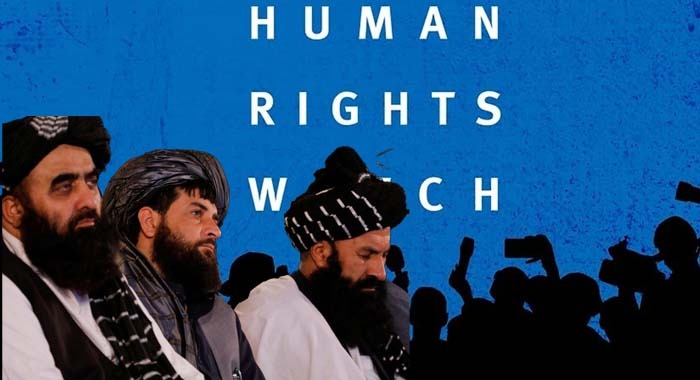Afghanistan’s once vibrant media landscape has been gutted under Taliban rule, as journalists face censorship, surveillance, detention, and torture for reporting anything perceived as critical of the authorities, Human Rights Watch said in a new report.
Since taking power in August 2021, the Taliban have imposed severe restrictions on the press, silenced women journalists, and forced hundreds of media workers into exile. The report warns that Afghan journalists who fled persecution are now at risk of being forcibly returned from host countries, including Türkiye and parts of Europe, to a country where they fear retaliation.
According to HRW, the Taliban’s intelligence agency and the Ministry for the Promotion of Virtue and Prevention of Vice (PVPV) closely monitor media content and punish reporters for “negative” coverage. Many newsrooms have been subjected to raids, with officials checking phones, confiscating computers, and interrogating journalists over their contacts with exiled or foreign media.
“Taliban officials increasingly compel Afghan journalists to produce only ‘safe,’ pre-approved stories,” said Fereshta Abbasi, the organization’s Afghanistan researcher. “They punish those who step out of line with detention and torture.”
Before the Taliban takeover, Afghanistan had hundreds of private media outlets, many supported by international donors. These included independent television, radio, and online platforms that provided diverse coverage and fostered public debate.
Now, more than half of those outlets have closed. Reporters Without Borders estimates that between 40 and 60 percent of media organizations have stopped operating, while the number of journalists has dropped by half. For women, participation has plummeted from about 1,400 before 2021 to just 600 in 2024.
The Taliban’s media decrees have effectively outlawed independent reporting. Journalists are prohibited from broadcasting or publishing anything “contrary to Islam,” “insulting national figures,” or “violating privacy.” Reporters are instructed to ensure “balanced” coverage and “only publish the truth,” though the criteria for these terms are undefined.
Taliban authorities often review stories before publication and censor content they claim could “harm public morale.” Failure to comply can lead to arrests or bans from reporting.
Journalists accused of working with foreign or exiled media are particularly at risk. HRW documented several cases in which detainees were beaten, choked, or humiliated during interrogation sessions. Some were forced to sign written pledges not to work again as journalists.
One reporter described being tortured with plastic bags placed over his head, slapped repeatedly, and called “American kid” for allegedly sharing information with opposition-linked media.
Hazara journalists, long targeted by the Taliban for their ethnicity, face even harsher treatment. One detained journalist recounted being told by intelligence officials: “A Hazara kid dared to speak against us? We can kill you whenever we want.”
In some cases, Taliban courts have prosecuted journalists on charges of propaganda or espionage. Those acquitted often remain under surveillance or face renewed arrests. HRW noted that several detainees have suffered lasting psychological trauma after release.
The Taliban’s strict gender policies have nearly erased women from the country’s media sector. In many provinces, there are no women working in news at all. Those still active face tight restrictions: they cannot report from offices shared with men, must travel with male guardians, and are banned from covering official events.
Female reporters say they have been turned away from press conferences and threatened for speaking to sources. “They stopped me at the gate and told me women aren’t allowed,” said one journalist from Herat. “That was the last time I tried to report.”
Authorities have also banned women’s voices from radio and television in several provinces, labeling them “private.” In October 2024, the Virtue and Vice Ministry prohibited women from reciting the Quran or singing in public.
Taliban media policy is marked by inconsistency. Rules vary from province to province, with local officials wielding broad discretion. Some regions, such as Kandahar—home to Taliban leader Haibatullah Akhundzada—enforce particularly strict bans on photography and interviews.
Journalists are often required to seek prior permission to cover events or travel to certain areas, including Panjshir, where anti-Taliban forces operate. Those who fail to do so risk detention or permanent suspension from work.
“The Taliban are not unified; each of them determines how they want to deal with the media,” said one journalist quoted in the report. “Rules differ from one province to another.”
Many Afghan journalists have fled to Türkiye, Germany, and the United States, living under uncertain legal status and facing the threat of deportation. HRW urged host countries to uphold the international principle of nonrefoulement, which prohibits returning individuals to countries where they face persecution or serious harm.
“The Taliban’s oppression of the media has increased as the need for independent reporting becomes ever greater,” Abbasi said. “Governments that promised to protect Afghans should extend that support to journalists and end all deportations to Afghanistan.”
HRW’s findings underscore the Taliban’s broader campaign to suppress dissent and control information. What remains of Afghanistan’s press operates under fear, censorship, and state surveillance — conditions that have made genuine journalism nearly impossible.
Without independent media, the report concludes, Afghan citizens are being denied access to information, while the world is losing visibility into one of the most repressive regimes in modern times.





